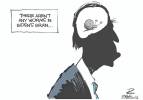Harm to housing: The consequences of making foreclosure impossible
Nevada’s housing market has been mangled by multiple government interventions. Politicians simply refuse to leave the resulting distortions in prices and inventory alone to correct themselves, leading to another round of interventions, and on and on.
Right on cue, state Sen. Justin Jones proposes even more post-meltdown meddling in housing. Senate Bill 321, dubbed the “Homeowner’s Bill of Rights,” is a wolf in sheep’s clothing, written to make it even more difficult for lenders to foreclose on borrowers who aren’t making their mortgage payments. We shudder to imagine the real-world consequences of what amounts to a state Dodd-Frank Act.
That’s because the Nevada Legislature already has empowered homeowners to remain in their homes for years without making a mortgage payment. AB284, which became law in late 2011, effectively halted foreclosures by imposing the country’s toughest standards — and potential criminal penalties — on lenders seeking to repossess distressed properties. As a result, Southern Nevada has a “shadow inventory” of tens of thousands of underwater homes that are delinquent on mortgage payments and an abnormally small inventory of existing homes for sale. Cash-paying investors are snapping up every entry-level house they can find, turning more owner-occupied homes into rental properties and denying first-time buyers the ability to take advantage of low prices and historically low interest rates.
Some legislative candidates campaigned last year on promises of dialing back AB284. But Sen. Jones wants to beef it up by banning the practice of “dual-tracking,” in which lenders continue to advance delinquent loans through the more-difficult foreclosure process while borrowers navigate any of the numerous government programs created to delay foreclosure. Under SB321, once a nonpaying borrower submits an application for mortgage assistance, the foreclosure process must stop. The pages of banking regulations written as state law impose all-new mandates on every interaction a lender has with a delinquent borrower. Counseling borrowers on options to foreclosure becomes the obligation of mortgage servicers — and they can’t charge for it. The bill effectively creates a right to live in a home free of charge, indefinitely. That’s not the kind of behavior lawmakers should encourage. Mortgages are contracts, and nonpayment harms investors.
Sen. Jones’ bill goes even further than the strict new rules adopted this year by the U.S. Consumer Financial Protection Bureau under the requirements of Dodd-Frank. Those federal rules apply only to large financial institutions — there are exemptions for small servicers, such as community banks and credit unions — and stop short of banning dual-tracking.
The bill is a boon for attorneys such as Sen. Jones. Lawyers would have scores of new opportunities to allege wrongdoing by servicers and sue on behalf of delinquent borrowers. Banking and borrowing would become more expensive.
Lenders have just started to figure out the rigors of AB284. SB321 would move the goalposts — again. While homeowners certainly enjoy rights, they do not have a right to housing. Sen. Jones’ bill is an abomination that will make our housing woes worse. Lawmakers should kill it.


















